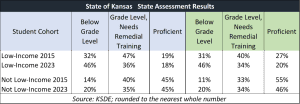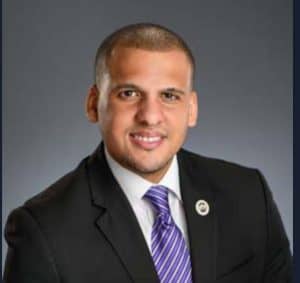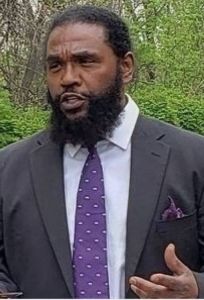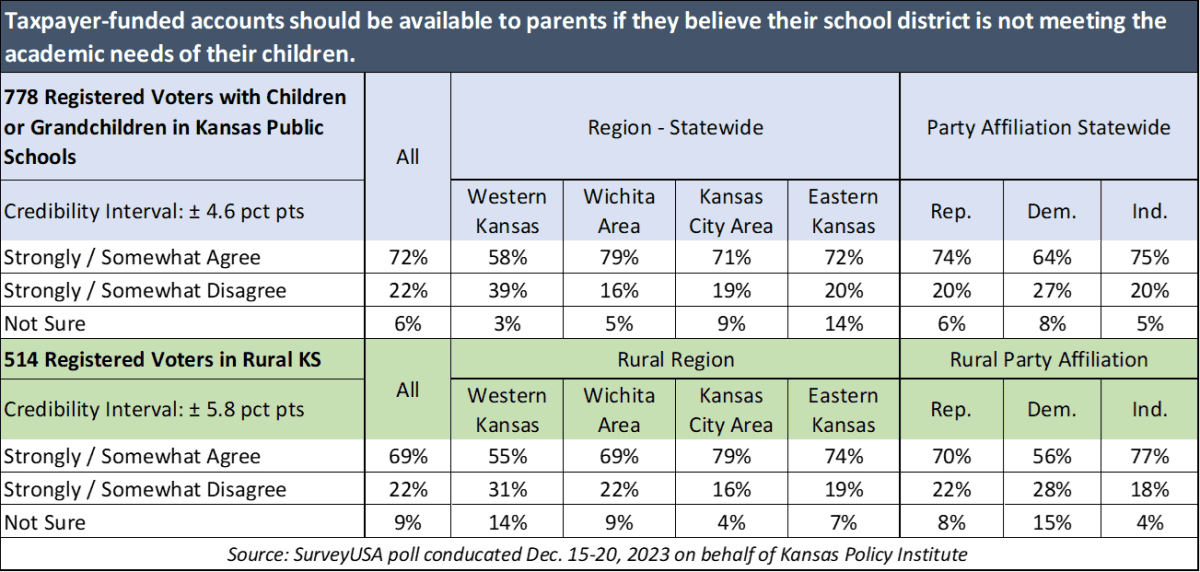“As I watch children in poverty, trapped in failing schools, who can hardly read, I’d be damned if I will continue to defend the status quo.”
 This recent quote from Louisiana Rep. Jason Hughes can also be said of Kansas students. In 2015, about a third of low-income students were below grade level in reading and math; now, almost half are below grade level, and only about 20% are proficient.
This recent quote from Louisiana Rep. Jason Hughes can also be said of Kansas students. In 2015, about a third of low-income students were below grade level in reading and math; now, almost half are below grade level, and only about 20% are proficient.
Hughes went on to say, “I know the political ramifications for me for voting for this bill. But I don’t need this $16,800 a year job bad enough to watch our children continue to live in poverty, trapped in failing schools, and not try to do something. And in the event I’m not reelected, this is what I know: my steps are ordered. My heart is pure. I came here to do tough things. I came here to make tough decisions. And I came here to put children first.”
Hughes is one of six Democrats who voted for universal school choice, passing the bill 71-32 and sending it to the State Senate.

Voting his conscience instead of toeing the party line and supporting the public education lobby demonstrates more than mere courage; unlike many politicians, Hughes is being refreshingly honest that helping students is more important than getting re-elected.
For far too many politicians – in both parties in Kansas and other states – getting re-elected is their #1 priority, and if that means poor kids must remain trapped in underperforming schools, so be it.
Only one Kansas Democrat – Rep. Marvin Robinson – has voted to allow poor kids to get the education they deserve. Mesha Mainor, a Democrat from Georgia, last year announced she switched to the Republican party over school choice, saying, “For far too long, the Democrat Party has gotten away with using and abusing the black community. For decades, the Democrat Party has received the support of more than 90% of the black community. And what do we have to show for it? I represent a solidly blue district in the city of Atlanta. This isn’t a political decision for me. It’s a moral one.”

However, it’s not just Democrats who choose the education lobby over students; many Kansas Republicans are also willing to abandon poor kids.
They offer a multitude of empty reasons to justify siding with the establishment instead of students, but none say that students will get a better education in public school. Examine their statements, and you’ll see that their focus is on what they say is better for schools; they hardly, if ever, mention students.
In private, many admit their true motivation is fear that their superintendents will run them out of office.
Voters can easily determine whether legislators choose re-election over students by asking a few simple questions of Kansas representatives and senators who vote against school choice:
- Is it acceptable to you that about half of low-income students cannot read at grade level?
- How many years do you think it will take the public school system to get at least 80% of low-income students to read at grade level?
- How many more years should low-income students have to wait before you would vote to let them take some of their taxpayer funding to a school their parents believe is a better opportunity?
Being fearful that standing up for students will prevent legislators from being re-elected is bizarrely paradoxical. Education officials oppose school choice because they don’t want competition and accountability, but voter support in both parties is overwhelmingly supportive.
Democrats, Republicans, and Independents support school choice
A December 2023 public opinion poll conducted by SurveyUSA on behalf of The Sentinel’s owner, Kansas Policy Institute, shows strong statewide support for education savings accounts for parents if they believe their school district is not meeting the academic needs of their children. Republicans support choice by a margin of 74-20, Democrats by a 64-27 margin, and Independents by a 75-20 margin.
The survey also found strong support across rural areas in all parties.

Chronic underperformance is not the fault of teachers; in Giving Kids a Chance with School Choice, we explore a mountain of evidence showing that low achievement falls squarely on management (district leadership, the State Board of Education, and the Department of Education, with assists from the state school board association. These education officials would like to see outcomes improve, but not if that means they must change their behaviors.
State legislators who oppose school choice cannot say their constituents don’t support it, and they certainly can’t say that the public school system is meeting the academic needs of most students, with a third of them unable to read at grade level. Whatever excuse they offer, legislators who oppose school choice programs could at least be honest and say it is worth having 150,000 reading below grade level.



